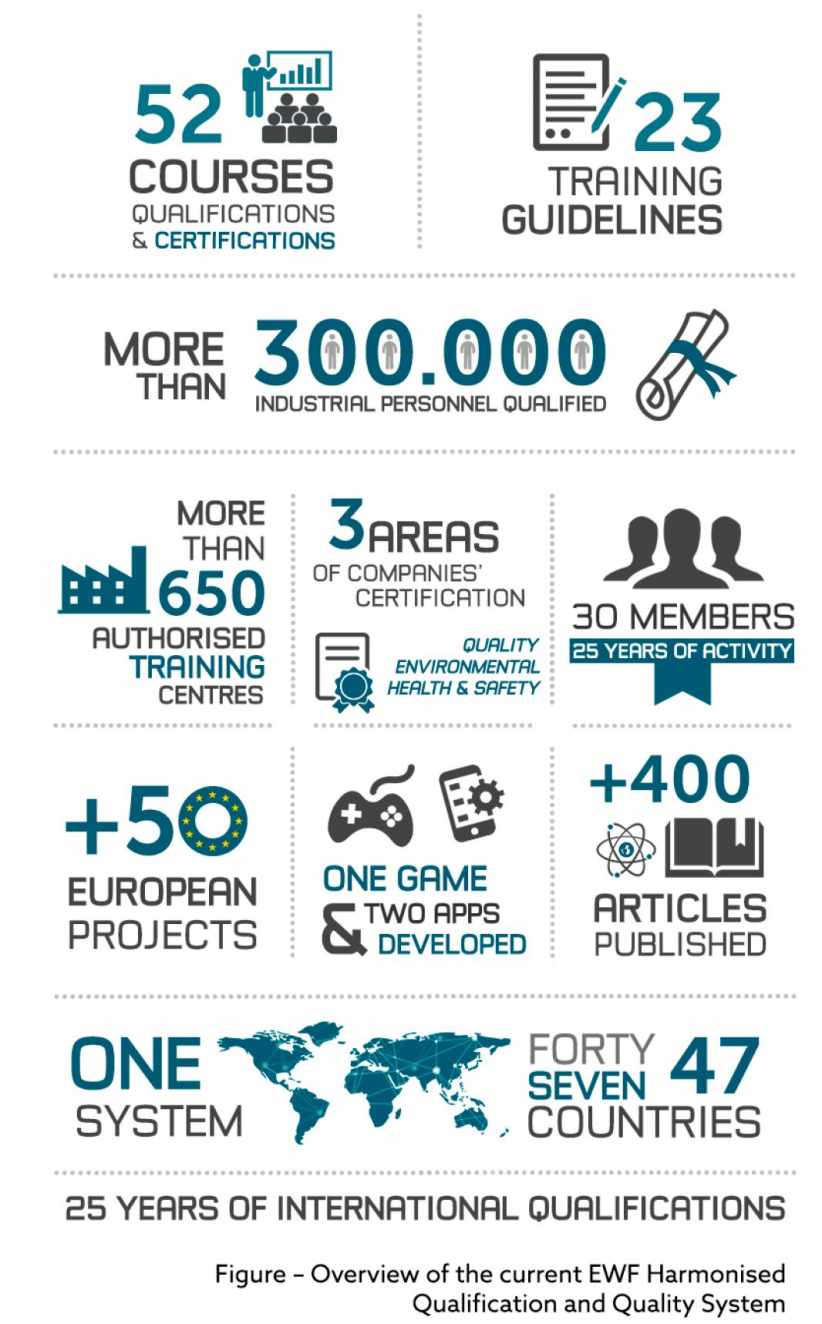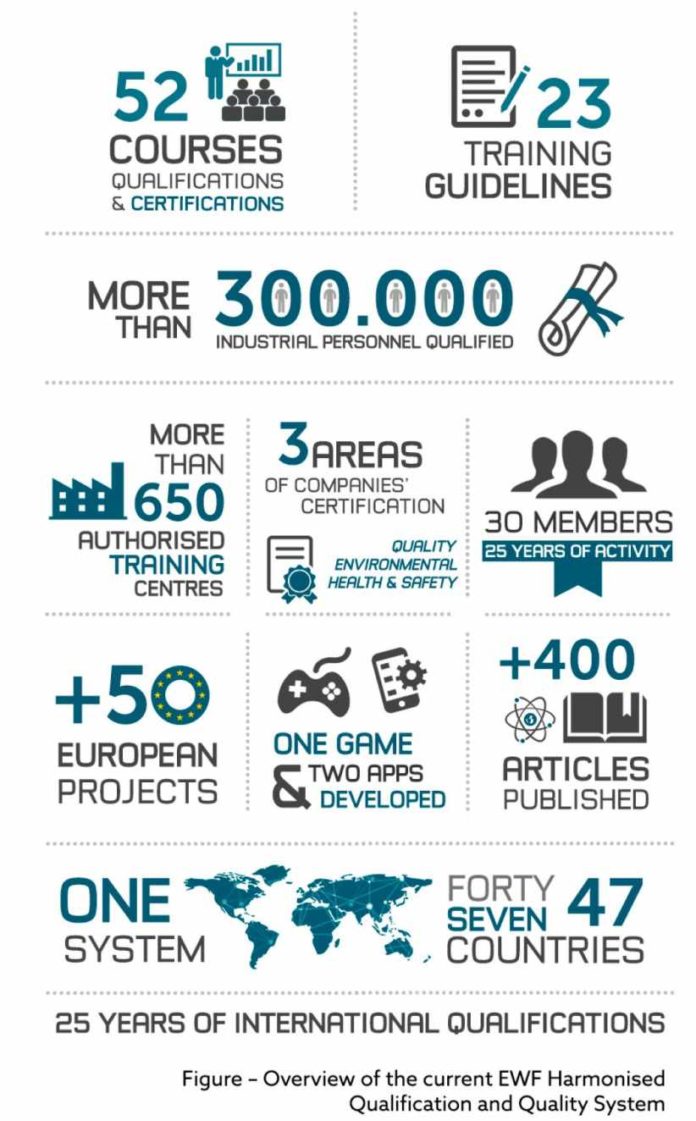A proven quality system at the heart of EWF’s effective global qualification ecosystem — BloomCast Consulting
As Industry 4.0 becomes mainstream, ensuring professionals are up to the new challenges is a key focus of the Federation

EWF_
PORTO SALVO, Portugal – June 19, 2018 – PRLog — The fourth industrial revolution has no boundaries, which means no sector is left unchallenged. For companies in manufacturing, change means becoming digital and manufacturing centres. For professionals, change means having to develop new skills and competences matching business and technological requirements that are quickly evolving which, in turn, puts a strain on traditional education systems. The answer to this qualification challenge, which is global in scope, is strongly dependent on the ability of traditional Education and Vocational Education and Training (VET) systems to bring forth curriculums and methodologies that are widely accepted and get the workforce up-to-speed with new business requirements and modern technologies being deployed.
EWF has been addressing that issue since 1992, with its harmonized and internationally recognized qualification system. As the number of countries where the system is used keeps growing, consistency of the qualifications given, regardless of the location, could become increasingly difficult. EWF’s strong quality system addresses just that, ensuring that qualifications requirements are met consistently throughout the entire ecosystem using its harmonized qualification system. This puts companies’ focus where it should be, deploying advanced technological solutions that make them more competitive.
According to Chris Eady, EWF’s President, “As we have done in the past with the creation of our current harmonized qualification system, we want to continue at the forefront of industry changes, and the improvements built into our quality system will keep it current and relevant for the foreseeable future”.
The fourth industrial revolution impact on qualifications
Manufacturers face increasing challenges, ranging from changing customer preferences, cost and capital pressures, shorter product lifecycles, new sources of disruptive competition and a quickening pace of business and demand. The fourth industrial revolution, with all its constituent technologies, will bring to life the “smart factory”, a concept of cyber-physical systems capable of autonomously exchanging information, triggering actions, and controlling each other independently. This facilitates fundamental improvements to the industrial processes involved in manufacturing, engineering, material usage, asset performance and management, as well as supply chain and lifecycle management. As a result, manufacturers will reinvent their business models to focus on value-added services, and/or entering new geographic markets or adjacent market segments.
In order to embrace this change, organizations need to equip their workforce with the required qualifications. As workplaces of the industrial age give way to work practices of the digital age, there is a growing need for further specialized knowledge, including remote, flexible and on-demand work. A recent survey on the implementation of digital technologies in Germany held by ZEW – Centre for European Economic Research, has highlighted that the diffusion of digital technologies in German businesses has created more employment overall, but has led to other changes, most significantly in the employment structure. Jobs that involve routine tasks are starting to dwindle in significance as a result of digital processes, while analytical jobs such as software development or programming and interactive jobs are experiencing considerable growth. Education is a key tool to manage the challenges ahead, since the economies of the future will be knowledge-driven and the ability to increase function-specific and complementary knowledge becomes the norm. This means that it is fundamental for Education to also change, as most education systems were built for the needs of prior employment opportunities.
The uniqueness of a proven quality system
To make knowledge acquisition and recognition more effective, a connection is needed not only between its two existing pillars, the traditional education systems used at Universities and the technical training given for specific jobs, but also between the learning profiles used on both. By strengthening this connection, knowledge transferability become increasingly effectively applied and supports industry’s growth.
To achieve that, a global harmonized qualification system is required, and EWF has, since 1992, been developing a process of harmonisation of the content of education and its implementation in terms of courses’ syllabus and hours of training allocated to each module. To stay in sync with a fast pace ecosystem, current courses are regularly updated and news ones launched for technologies such as additive manufacturing and laser welding. This creates a virtuous cycle, enabling quick adoption of new technologies and paving the way for its quick evolution. Its success can be best acknowledged by saying that Cedefop – The European Center for the Development of Vocational Training – has considered that EWF’s Harmonized Qualification System should be seen as a best practice for international sectorial harmonisation of qualifications.
Furthermore, through its EU collaboration with several European organisations, and by its involvement in various European projects (such as RAINBOW), EWF is bringing its contribution to the European Commission to support policy reform and European Policy tools.
Within the RAINBOW project, EWF has been assessing the main aspects necessary for referencing international qualifications in EQF. One of these aspects relates to the Quality Assurance system which needs to be the pillar of any system for qualification of personnel used in various countries. The European Council Recommendation of 22 May 2017 on the European Qualifications Framework for lifelong learning for the EQF has established a list of 10 criteria for a quality system to comply with. The EWF Quality Assurance system, established 20 years ago, includes these 10 criteria and adds a few more which, from experience, have proven to be essential.
To ensure this, EWF has made its quality system compliant with ISO/IEC 17065, guaranteeing that the resulting qualifications had the same uncompromised quality, regardless of the country where the course was taken. Hence, the uniqueness of EWF’s system is two-fold. It is based on a unique quality assurance system, supported by aharmonised system for examinations, ensuring the same qualification can potentially be awarded in any country.
EWF’s quality system includes the ecosystem of members, other relevant stakeholders and the training centers. The members are responsible for the identification of the most appropriate Authorised Nominated Body, who manage EWF’s system in the country and are responsible for ensuring that the standards of implementation of the EWF education, examination, qualification systems and/or personnel certifications schemes are maintained.
An Assessment structure has been put forth, one that ensures that, regardless of location and entity, end results are consistent. This structure comprises Lead Assessors, Peer Assessors and Distance Learning Assessors. They are charged with the auditing of the required compliance with EWF’s quality system rules. This process provides the critical mass of professionals required to quickly advance and respond to changes in technologies and ensuring their swift adoption.
In summary, the uniqueness of EWF’s harmonized qualification and quality systems create a swift pathway for the recognition of qualifications in the countries that are already engaged with the system. Currently, this ecosystem comprises 46 countries, 44 ANBs (Authorized Nominated Bodies) and 683 ATBs (Authorised Training Bodies). The network also includes 55,000 companies worldwide. The training centers are evaluated in order to ensure full compliance with the stringent requirements from EWF in order to deploy and teach the EWF/IIW Qualification courses, combining both supporting knowledge and application experience, in a close relation with industry and their needs.
About the European Federation for Welding, Joining and Cutting
EWF is a pioneer in implementing a harmonised qualification and certification system for joining professionals. Through European projects, EWF has been innovating in training methodologies, and involved in the development of new technologies and uses for joining. Through its member organisations, EWF has established a firm link to the local industry, providing knowledge and training as well as participating in research initiatives that address the most pressing questions and challenges in the field of joining technologies.
http://www.ewf.be






